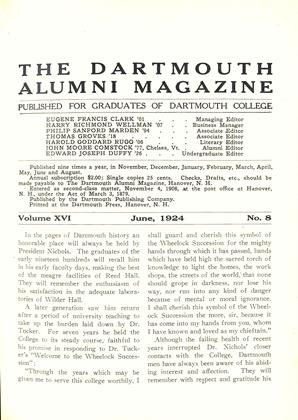Since the last meeting of the Trustees Harry Harmon Blunt, a member of the Board, died, December 29, 1923, and Ernest Fox Nichols, ex-president of the College died, April 29, 1924. The following commemorative action relating to the two was taken:
Resolved, that the trustees of Dartmouth College make formal record of their sense of loss sustained in the death, on December 29, 1923, of their associate, Mr. Harry Harmon Blunt of the class of 1897. Mr. Blunt was elected to the board on nomination of the alumni, April 22, 1921, to fill a vacancy in the list of alumni trustees and was reelected to the board after renomination by the alumni, in June, 1921.
Mr. Blunt brought to the service of the College a vital interest and a willingness to devote time and attention to its affairs which were of immediate value and which promised ever increasing usefulness. It is impossible in formal way to recount in detail the whole significance of a contribution to the College such as he made, but it may be stated specifically that through his own training and taste there was brought to the board an influence both timely and effective concerning which it is desired herein to make grateful record and for the value of which it is desired to express deep appreciation.
Resolved, that the trustees of Dartmouth College assembled at Hanover learn with deep regret of the sudden death of Dr. Ernest Fox Nichols and wish to place on record their appreciation of the valuable service he rendered the College.
He came to Dartmouth as professor of physics in 1898 and carried on in the laboratories of this institution the experimental work that established him at once among the foremost research scientists in the United States, achieving results that focused the attention of the scientific world on the Dartmouth physical laboratories. Later, as president of the College from 1909-1916, he rendered service of great value to the institution at a critical period in its history.
His high ideals of scholarship, his unselfish devotion to his work, and his uniform courtesy to all with whom he came in contact left an impression upon the College that can never be effaced.
 View Full Issue
View Full Issue
More From This Issue
-
 Article
ArticleWHAT ARE THE TRUSTEES DOING?
June 1924 By Lewis Parkhurst '78 -
 Article
ArticleMATERIES MEDICI
June 1924 By Edwin J. Bartlett '72 -
 Article
ArticleSaturday Morning Session
June 1924 -
 Article
ArticleANNUAL MEETING OF THE SECRETARIES
June 1924 -
 Article
ArticleThe Responsibility of the College to its Alumni
June 1924 By P. S. M. -
 Class Notes
Class NotesCLASS OF 1903
June 1924 By Perley E. Whelden
Article
-
 Article
ArticleASTRONOMERS WILL MEET IN HANOVER THIS SUMMER
May, 1924 -
 Article
ArticleSix Faculty Members Who Retire This Month
June 1952 -
 Article
ArticleCatholic Student Center
May 1961 -
 Article
ArticleTwist '41, Turned Down by Date5 Wins Key Drawing
JAN./FEB. 1980 -
 Article
ArticleThe Doctor is In Oxford
April 1993 -
 Article
ArticlePROF'S CHOICE
October 1995 By Gorden Russell

